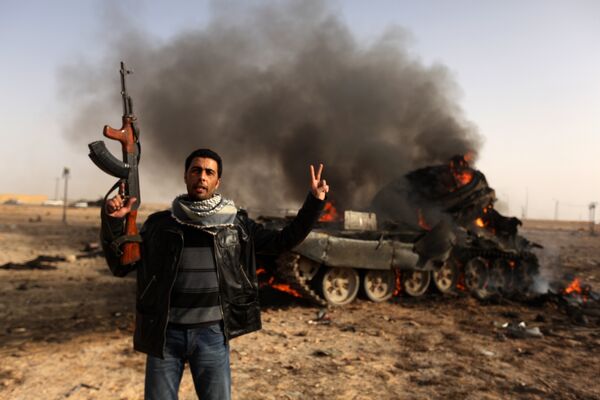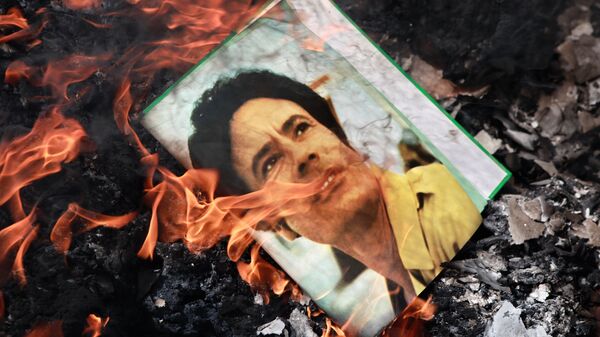According to ex-State Department officer and respected historian William Blum, the US has intervened to overthrow or attempt to overthrow foreign governments, including those of its own allies, over fifty times since 1945.
To prevent the current article from turning into a thousand-page opus, here are a few examples of US efforts to meddle, either politically or militarily, in the affairs of other nations over the last decade, with these efforts having disastrous consequences.
Syria 2011
In March 2011, piggybacking on the wave of Arab Spring protests sweeping much of the Middle East and North Africa, cities across Syria were hit with protests calling for the overthrowal of the country's government. Attempting to placate his opponents, President Bashar Assad instituted a series of sweeping reforms, including a modified constitution based on political pluralism, as well as presidential elections and term limits.
Unsatisfied with the reforms, the opposition, provided with arms, funding and political support by the US and its allies, started to wage a direct armed conflict against the Syrian government. American investigative journalists later discovered that the State Department and CIA continued to provide militants with weapons, vehicles "and other gear" even after it became clear that their ranks had been swamped by jihadist extremists, including al-Qaeda*. In mid-2014, the war was joined by Daesh (ISIS)*, which captured swathes of Syria.

In the brutal conflict which followed, at least 400,000 Syrians died, according to a 2016 UN report, with much of the country's infrastructure destroyed and over 12.5 million people internally or externally displaced.
Since then, with Russian military assistance provided at Damascus' request, the Syrian government managed to liberate the vast majority of territory from the motley collection of militias and terrorists, crushing Daesh in the east and confining the rest of the militants in a small enclave in northwestern province of Idlib. Nevertheless, despite its battle against Damascus being clearly lost, Washington and its allies have refused to recognise the Assad government's legitimacy or provide aid to rebuild the war-torn country, even while promising to finally end the US' illegal military presence in the country.
Libya 2011
Taking advantage of the same, ill-fated Arab Spring in 2011, US officials, backed by their British and French allies, took aim at Libya, led by long-time "thorn in the West's side" Muammar Gaddafi. In the spring of 2011, President Barack Obama accused Gaddafi's "brutal regime" of having "lost the confidence of his people and the legitimacy to lead," with the US and about a dozen of its NATO allies soon launching a campaign of airstrikes against the North African country when it became clear that the revolt was about to be crushed by Gaddafi's forces.
The campaign, culminating in the destruction of the Libyan government, the brutal, highly publicised murder of Gaddafi, and the victory of anti-government rebels, many of them Islamists, was a short-lived victory for NATO. Since 2011, tens of thousands of Libyans have died, hundreds of thousands more have fled the country, and the North African nation has essentially collapsed into a collection of warring factions.

For Europe, the Libyan intervention has caused a new kind of chaos, with Libya becoming a preferred transit point for human smugglers and Middle Eastern and African migrants and refugees heading for Europe. Obama later admitted that his failure to deal with the aftermath of the Libya attack was the "worst mistake" of his presidency.
Ukraine 2014
In February 2014, after months of protests stemming from President Viktor Yanukovich's decision to postpone the signing of a controversial association agreement with the European Union, the US and its EU allies successfully pulled off a coup d'état in Kiev. Evidence of bald-faced US meddling was revealed during the crisis itself, with a leaked phone call between US Assistant Secretary of State Victoria Nuland and US Ambassador to Ukraine Geoffrey Pyatt in the weeks before the coup showing open planning to replace Yanukovich, who was democratically elected in 2010, with a group of pro-EU politicians.

In the aftermath of the coup, which included Nuland's famous Maidan cookies photo-op, as well as a cool $5 billion in US taxpayers' money spent on the construction of "democratic institutions" in Ukraine, the Eastern European country descended into chaos, including a civil war in its east, while Crimea broke off from Kiev entirely and rejoined Russia following a peninsula-wide referendum. It's estimated that upwards of 35,000 people have been killed in the civil war, with hundreds of thousands fleeing the violence in the Donbass region to Russia. Amid the political and economic crisis facing the rest of Ukraine, hundreds of thousands of people, mostly young Ukrainians, are believed to have left the country, with Ukraine's 2013 population of 45.5 million dwindling to 42 million by late 2018.
The 2014 coup was the second Western-backed color coup in Ukraine in a decade. In 2004, street protests over highly contested elections in which Yanukovych defeated pro-western politician Viktor Yushchenko by a narrow margin culminated in an unprecedented repeat vote, which Yushchenko handily won amid the vote-rigging claims against his opponent.
Postscriptum: Venezuela Déjà vu
In addition to the above cases, which serve as the most "colourful" examples of the disastrous consequences of US meddling, the last decade has seen multiple other attempts by US officials to foment the overthrow of democratically-elected governments, or intervene to turn delicate situations from bad to worse. This meddling has included support for the 2017-2018 protests in Iran, US military support for the Gulf coalition's war in Yemen, and direct US and EU support for the so-called "Colourful Revolution" which rocked Macedonia in 2016.
As for Venezuela itself, the oil-rich country was one of the first to experience US colour revolution technology in action. In 2002, US-allied political forces and business interests attempted to stage a coup against President Hugo Chavez, Maduro's predecessor. Maduro, facing a long-standing political and economic crisis at home, has repeatedly accused the US and its regional allies of plotting another coup, and even alleged that Washington had instructed its Colombian allies to organise his murder following the failed assassination attempt against him last August.
In 2017, then-CIA director Mike Pompeo admitted that the US was working to foment regime change in Venezuela. President Trump, meanwhile, has threatened a "military option" against the Maduro government "if necessary."
Ultimately, only time will tell whether Washington will follow through on its threats, and whether Venezuela's Bolivarian Republic, defended by Chavez in 2002, can be saved again.
On Friday, the Russian Embassy in the United States expressed hope that Washington would not resort to "foreign ventures" to try to get the US public's mind off the government shutdown crisis. The Russian Foreign Ministry, meanwhile, stated that any US military interference in the sovereign affairs of the Latin American country would be "catastrophic." The statement comes following remarks by Russian Prime Minister Medvedev, who characterised the US recognition of Guaido as a "quasi government coup," and stressed that "no one has the right to illegally remove from power the head of state who has just won an election, regardless of whether some countries or political forces like him as a person or not."
We are witnessing as yet another head of state is being unconstitutionally “elected” by the crowd out there in the streets, and a number of heads of state support this quasi government coup. They were very quick to respond, as if on cue #Venezuela
— Dmitry Medvedev (@MedvedevRussiaE) 24 января 2019 г.
How would the American people respond, for example, to the Speaker of the US House of Representatives declaring herself the new president against the backdrop of the government shutdown? But when it happens somewhere else, this is viewed as common practice #Venezuela
— Dmitry Medvedev (@MedvedevRussiaE) 24 января 2019 г.
*Terrorist groups outlawed in Russia and many other countries.

